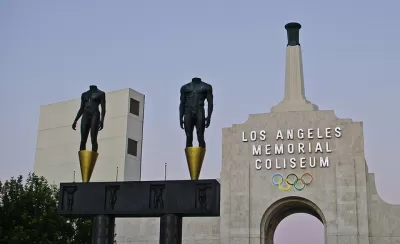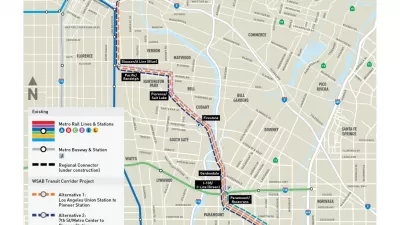Los Angeles officials have been working for years to deliver a suite of transit projects in time for the 2028 Olympics. Planners now hope federal infrastructure funding could reinvigorate the effort.

“If planners and political leaders can pull it off, spectators of the 2028 Olympics would experience a very different Los Angeles from the one traffic-weary commuters know today, one that would endure long past the Games,” reports Rachel Uranga for the Los Angeles Times.
“Olympic organizers are still in the process of creating a transportation plan. But with federal and state authorities spending record amounts on projects resulting from President Biden’s $1-trillion infrastructure law, local planners have a number of proposals for the Olympics,” according to Uranga.
As the article notes, the city is already underway with a number of transportation projects that will contribute to non-automotive mobility during the games, including the D Line (Purple Line) extension to the Westside of Los Angeles, the Regional Connector through downtown, and the long-delayed Crenshaw Line, which bring light rail close to the Los Angeles International Airport after passing through South Los Angeles neighborhoods like Leimert Park along the Crenshaw Corridor.
Moreover, the city’s leadership has presented these Olympics as a chance to accelerate transit projects around the region, with an initiative known as 28 by 28 (the plan has been described as “doomed” and “depressing” by local media since first proposed by Mayor Eric Garcetti in 2017.
So planners for the Los Angeles County Metropolitan Transportation Authority (Metro) have gone back to the drawing board to identify 200 projects “that could help support the Games,” according to Uranga, including “a people mover in Inglewood, an extension of the C Line (formerly the Green line) from Redondo Beach Station to Torrance, a rail line through the East San Fernando Valley, a cybersecurity update on Metro’s system, new protected bike lanes across the region and more bike-sharing programs.”
More details on the various states of these projects (some are already “on the books,” in the words of Uranga), the LA28 task force to coordinate transportation planning across jurisdictions, and the political prospects for the desired transit projects are available in the source article below.
FULL STORY: People mover, new bike paths and bus lanes: 2028 Olympics could fuel a transit boom in L.A.

Planetizen Federal Action Tracker
A weekly monitor of how Trump’s orders and actions are impacting planners and planning in America.

Maui's Vacation Rental Debate Turns Ugly
Verbal attacks, misinformation campaigns and fistfights plague a high-stakes debate to convert thousands of vacation rentals into long-term housing.

Restaurant Patios Were a Pandemic Win — Why Were They so Hard to Keep?
Social distancing requirements and changes in travel patterns prompted cities to pilot new uses for street and sidewalk space. Then it got complicated.

In California Battle of Housing vs. Environment, Housing Just Won
A new state law significantly limits the power of CEQA, an environmental review law that served as a powerful tool for blocking new development.

Boulder Eliminates Parking Minimums Citywide
Officials estimate the cost of building a single underground parking space at up to $100,000.

Orange County, Florida Adopts Largest US “Sprawl Repair” Code
The ‘Orange Code’ seeks to rectify decades of sprawl-inducing, car-oriented development.
Urban Design for Planners 1: Software Tools
This six-course series explores essential urban design concepts using open source software and equips planners with the tools they need to participate fully in the urban design process.
Planning for Universal Design
Learn the tools for implementing Universal Design in planning regulations.
Heyer Gruel & Associates PA
JM Goldson LLC
Custer County Colorado
City of Camden Redevelopment Agency
City of Astoria
Transportation Research & Education Center (TREC) at Portland State University
Jefferson Parish Government
Camden Redevelopment Agency
City of Claremont





























